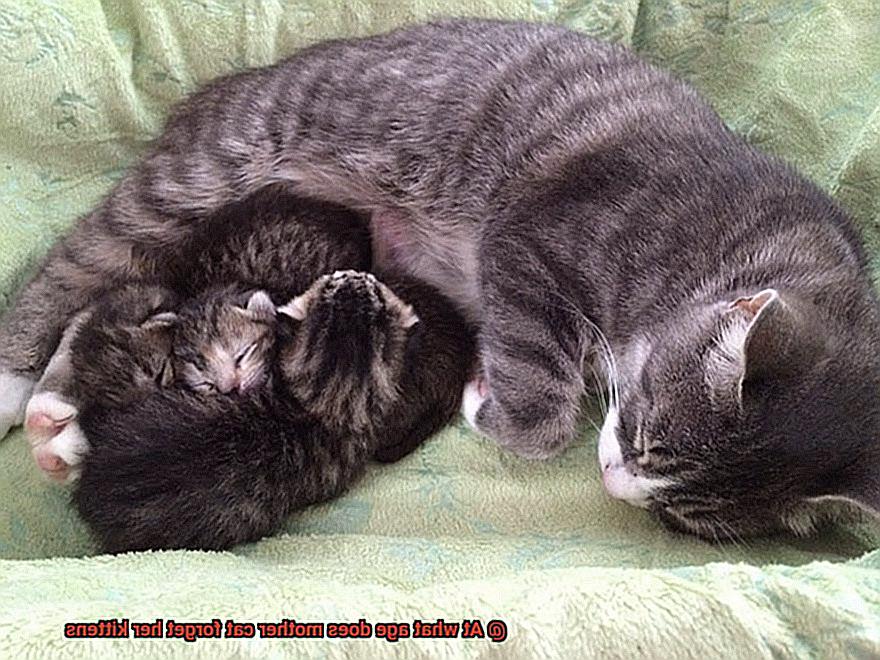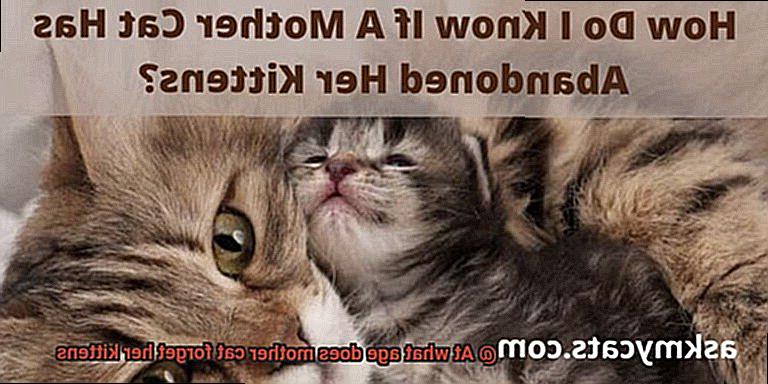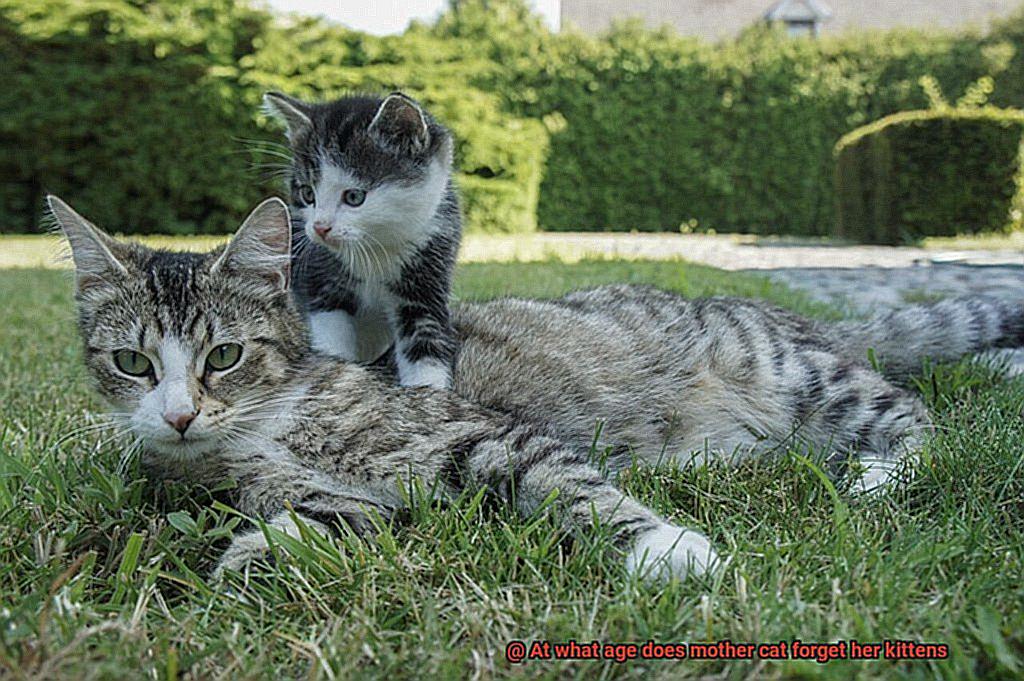Have you ever watched a mother cat care for her kittens and wondered if she remembers them once they’ve grown up and left the nest? As an animal expert, I’m thrilled to share some intriguing insights with you.
When young kittens enter the world, they rely entirely on their mother for sustenance and protection. The bond between a mother cat and her offspring is crucial during these early weeks of life. But as the kittens become more independent and start to wean, the mother’s connection with them gradually fades. So, at what point does she forget about them entirely?
In this blog post, we’ll explore the fascinating world of feline behavior to answer this question. We’ll delve into how mother cats form bonds with their kittens and examine their natural instincts. Plus, we’ll touch on whether a mother cat can recognize her offspring even years after they’ve separated.
So get ready to learn all about this captivating topic. Whether you’re a seasoned pet owner or just curious about our feline friends, there’s something here for everyone. Let’s dive in and discover at what age does mother cat forget her kittens.
Factors that Affect the Separation Process
Mother cats have a deeply ingrained maternal instinct, and they care for their young until they become self-sufficient. However, as kittens grow older, the mother cat may start to distance herself from them. This is a gradual process that depends on several factors, including the number of kittens, their age, and the mother cat’s personality.
The age of the kittens plays a crucial role in the separation process. Younger kittens who are still heavily reliant on their mother for food and warmth can make it harder for her to forget about them. The mother cat’s strong maternal instinct makes it difficult for her to let go until she believes that her kittens can fend for themselves.

Another critical factor that affects the separation process is the bond between the mother cat and her kittens. If she spends a lot of time with them and forms a strong bond, it can be harder for her to forget them. Conversely, if she hardly spends time with them or shows aggression towards them, she may find it easier to move on once they are separated.
Additionally, the environment in which the mother cat lives plays a significant role in how she handles separation. A stressful or unstable environment can make it more challenging for her to adjust and move on from her kittens. On the other hand, a calm and stable environment may make it easier for her to forget about them.
It is essential to remember that every cat is different and will react differently to separation from their kittens. Some mother cats may be more protective than others, making it harder for them to let go of their young ones. Furthermore, if a mother cat is spayed before giving birth, she will not experience similar maternal instincts as an unspayed cat.
When Does Weaning Begin?
Weaning is the gradual process of introducing solid food to kittens and reducing their dependence on their mother’s milk. Typically, it starts when kittens are around four weeks old, but this can vary depending on the mother cat and her litter.
How do mother cats know when to start weaning their kittens? They instinctively begin to discourage their kittens from nursing by moving away or even batting them away with a paw. As kittens become more curious and active, they’ll start to explore their surroundings and show an interest in solid food. This is the perfect time to introduce them to a mix of kitten food and water.
It’s crucial to remember that weaning should be a gradual process. Kittens should still have access to their mother’s milk or kitten formula until they are fully transitioned onto solid food. This can take up to four weeks, during which time the mother cat will continue to groom and care for her kittens.
After weaning, you may wonder if the mother cat forgets about her kittens. The answer is no. Weaning marks the beginning of the mother cat’s detachment from her litter, but she’ll continue to keep a watchful eye over her kittens even after they’ve been weaned. However, she may become less attentive over time as her kittens grow more independent.
Signs of Disinterest from the Mother Cat
It’s important to be aware of signs of disinterest that could indicate the mother cat is losing interest in her little ones. Here are some key indicators to look out for:
- Lack of grooming: Grooming is a crucial bonding activity between mother cats and their kittens. If the mother cat suddenly stops grooming her kittens, it could be a sign that she’s losing interest in them. Keep an eye on her behavior as this could be a signal that she’s ready to move on.
- No longer nursing: As kittens grow and begin eating solid food, they typically stop nursing from their mother. However, if the mother cat stops allowing her kittens to nurse before they’re ready, it could be another sign of disinterest.
- Increased aggression: While some discipline from the mother cat is normal, excessive aggression towards her kittens could indicate that she’s trying to push them away. If you notice your mother cat hissing, growling or swatting at her kittens more than usual, it’s worth keeping a closer eye on their behavior.
- Avoidance or less time spent together: As kittens become more independent, it’s natural for the mother cat to start distancing herself from them. If you notice your mother cat avoiding her kittens or spending less time with them, it could be a sign that she’s ready for them to explore on their own.
The Lifelong Bond Between a Mother and Her Kittens

It is a relationship that is both nurturing and protective, with the mother cat taking care of all the needs of her young from the moment they are born. From feeding to grooming, she ensures their survival.
But it is not just about survival; this bond is emotional and biological. Studies have shown that even after years of separation, a mother cat can recognize and respond to the scent of her offspring. During nursing, the release of hormones such as oxytocin strengthens the connection between mother and kittens. Along with basic needs, the mother cat imparts important life skills like hunting and socialization as the kittens grow.

However, there comes a time when the mother cat must let go. At around 12 weeks of age, the kittens are fully weaned and can fend for themselves. The mother cat gradually distances herself from her offspring, allowing them to explore and play independently.
But this doesn’t mean that the bond is severed. Even after they have left her care, the mother cat may still remember her kittens and react positively if she encounters them later in life. In fact, some cats form close relationships with their adult offspring and even become protective of them.
Different Temperaments of Mother Cats
Understanding these temperaments is crucial for ensuring the wellbeing of both the mother cat and her young.

Some mother cats are fiercely protective of their kittens and will keep a close eye on them. These cats are highly attentive, making sure their litter is fed, cleaned, and safe from any potential threats. However, this level of protection can sometimes become too much, leading to aggression towards humans or other animals perceived as a danger to their young.
Conversely, some mother cats may show less interest in their kittens as they grow up. This can be due to various reasons such as illness or stress. When a mother cat is unwell or overwhelmed by too many kittens in her litter, she may not have the energy or desire to care for them adequately. In such cases, pet owners need to step in and provide additional support to ensure the health of the kittens.
Interestingly, some mother cats may become more affectionate towards their kittens as they age. Domesticated cats that have had positive human interactions tend to view humans as a source of comfort and security for their young. These mother cats may seek out human attention while still providing care for their litter.
It is important to note that these different temperaments can impact the health and wellbeing of both the mother cat and her kittens. If a mother cat is overly aggressive or uninvolved with her litter, it could lead to behavioral issues in her offspring. Conversely, if a mother cat is too affectionate or dependent on humans for support, it could cause anxiety for both her and her young.
To ensure the health and happiness of your feline family members, recognize the behaviors associated with each temperament type. Here are some sub-topics you should consider:
- Signs of aggression in mother cats
- How to support a mother cat with too many kittens
- Ways to provide additional support to unwell mother cats
- The importance of positive human interactions for domesticated mother cats
- How to manage overly affectionate mother cats
Spayed Cats and Their Lack of Maternal Instincts
This can be concerning, especially if you’re planning on spaying your furry companion or if you’ve already done so. However, fear not, as we delve deeper into this topic and provide you with all the fascinating details you need to know.
Firstly, let’s understand what spaying is. This surgical procedure removes the reproductive organs of female cats, rendering them incapable of reproducing. While this procedure is crucial in preventing unwanted litters of kittens, it can also lead to a loss of maternal instincts in some cats.
This change in behavior is due to the hormonal shift that occurs after spaying. Female cats produce hormones such as estrogen and progesterone, which regulate their reproductive cycles and maternal behaviors. When these hormones are removed, it can affect the cat’s behavior towards her kittens.
It’s important to note that not all spayed cats will lose their maternal instincts. Some cats may still display maternal behaviors towards their kittens, while others may not show any interest at all. The degree to which a spayed cat loses her maternal instincts can vary depending on several factors, including the age at which she was spayed, her individual personality, and her relationship with her kittens.

If you’re planning on spaying your female cat, it’s recommended that you do so before she has had a litter of kittens. This is because cats that are spayed before having a litter may be less likely to display maternal behaviors towards any future litters. However, if your cat has already had a litter before being spayed, she may still exhibit some maternal instincts towards her offspring.
It’s important to remember that even if a spayed cat does not display typical maternal behaviors towards her kittens, she can still provide them with proper care and nutrition. As long as the kittens are being provided with food, water, warmth, and cleanliness, they will be able to thrive even without their mother’s affection.
How to Help a Mother Cat Care for Her Kittens
Assisting a mother cat in caring for her kittens is crucial in ensuring that they grow up to be healthy and well-adjusted adult cats. Here are five tips that can help you provide the best care for your cat and her litter.
Create a Safe and Comfortable Environment
Mother cats need a warm and comfortable place to care for their kittens. You can set up a cozy nest for them with soft bedding, such as blankets or towels. It’s important to keep the area clean and well-ventilated to prevent the spread of disease or infection. Make sure that the nest is in a quiet room where the mother cat can nurse and care for her kittens undisturbed.
Assist with Feeding
Mother cats will naturally feed their kittens, but sometimes they may need assistance. You can provide them with fresh water and high-quality kitten food or wet cat food to ensure they have the necessary nutrients to produce milk. Supplementing their diet with kitten milk replacement is also essential to provide all the necessary nutrients to support healthy growth.
Monitor Health Regularly
It is important to monitor the health of both the mother cat and her kittens regularly. Look out for any signs of illness or infection, such as lethargy, loss of appetite, or diarrhea. If you notice any of these symptoms, seek veterinary attention immediately. Early diagnosis and treatment can prevent serious health issues later on.

Provide Socialization Opportunities
Socializing kittens from an early age is important to ensure they become well-adjusted adult cats. Play with them, spend time with them, and introduce them to other friendly cats. This will help them develop social skills and create strong bonds with their mother and other cats.
Maintain Cleanliness and Hygiene
Keeping the mother cat and her kittens clean and free from parasites is essential for their overall health and well-being. Clean their bedding regularly, groom them with flea combs, and use topical treatments to prevent fleas, ticks, and other pests from infesting them. Regular visits to the vet for vaccinations and check-ups can also help maintain their health.
Tips on Preparing Kittens for Independence
As adorable as they may be, kittens cannot rely on their mother forever, and it becomes essential to prepare them for independence. Preparing kittens for independence is crucial for their long-term success and happiness. In this blog post, we will discuss the importance of preparing kittens for independence and the tips that can be used to help them become independent.
Gradual Separation
Gradual separation is an important step in preparing your kitten for independence. Start separating them from their mother slowly, over a period of time. This will help them adjust to being on their own and reduce the stress and anxiety they may feel when they are suddenly separated from their mother. Gradual separation also allows the kitten to learn how to fend for themselves gradually.
Socialization
Socialization is crucial for a kitten’s development because it helps them learn how to interact with others appropriately. Introduce your kittens to new people, animals, and environments. This will help them become more confident and comfortable in unfamiliar situations. Socializing your kitten will help them become more adaptable, which will be useful as they grow older.
Litter Training
Teach your kittens how to use the litter box from an early age. This will help them develop good habits and make them more independent in terms of cleanliness. Litter training is an essential part of preparing your kitten for independence because it teaches them how to take care of themselves when it comes to hygiene. It also helps keep your home clean.
Feeding
Gradually transition your kittens from milk to solid food so they can learn how to feed themselves. This will help them become more independent and self-sufficient when it comes to food. Feeding is an essential part of preparing your kitten for independence because it teaches them how to take care of themselves when it comes to basic needs. Ensure that you provide a balanced diet that meets their nutritional requirements.
Playtime
Encourage playtime with toys and other objects. This will help them develop their physical abilities and coordination, which will be useful when they start exploring their environment on their own. Playtime is an essential part of preparing your kitten for independence because it helps them learn how to entertain themselves. Interactive playtime with their humans can also benefit kittens by helping them bond with their owners.
PEwefpIB_Hw” >
Conclusion
In conclusion, the bond between a mother cat and her kittens is vital during their early weeks of life. As they grow older and more independent, the mother’s connection gradually fades away. The separation process depends on numerous factors such as the number of kittens, their age, and the mother cat’s personality. Weaning is a gradual process that typically begins when kittens are about four weeks old, although this could vary depending on the litter.
The relationship between a mother cat and her kittens is both emotional and biological. Research has shown that even after years of separation, a mother cat can recognize and respond to the scent of her offspring. Furthermore, some cats form close relationships with their adult offspring and even become protective of them.
Understanding different temperaments in mother cats is critical for ensuring their well-being as well as that of their young ones. If you plan to spay your female cat, it’s recommended that you do so before she has had a litter of kittens to prevent losing maternal instincts.
Assisting a mother cat in caring for her kittens is crucial in ensuring that they grow up to be healthy and well-adjusted adult cats. Gradual separation, socialization, litter training, feeding, and playtime are all essential steps in preparing kittens for independence.
In summary, comprehending feline behavior aids us in providing better care for our furry companions throughout their lives.

